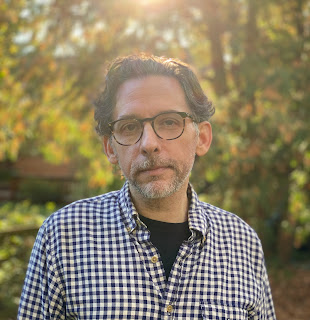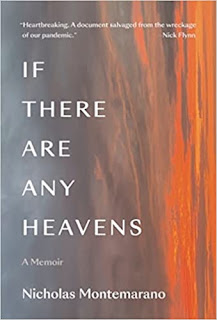Nicholas Montemarano is the author of the new book If There Are Any Heavens: A Memoir. It focuses on the death of his mother, Catherine Montemarano, from Covid. Montemarano's other books include the novel The Senator's Children, and his work has appeared in a variety of publications, including Esquire and Zoetrope. He is the Alumni Professor of Creative Writing and Belles Lettres at Franklin & Marshall College in Lancaster, Pennsylvania.
Q: First of all, I'm so sorry for your loss, and my thoughts are with you and your family...
Why did you decide to write If There Are Any Heavens?
A: I started writing about my mother's death a day or two after her funeral, when I arrived back home in Pennsylvania. I didn't know I was writing a book. I simply needed to write what had happened because part of me couldn't quite believe it.
A death from Covid is both sudden and not: my mother, a healthy person, was suddenly very sick, but her dying took three or four weeks, from her first symptoms to her last breath, with many ups and downs, and with hope for recovery. It's a unique, bewildering way to lose someone, and I think that's why I felt an immediate need to write the story.
Q: You begin the first entry by saying “this is not a poem.” What did you think of it as you were writing it?
A: I used broken lines immediately, intuitively, but I always considered it a memoir. The use of line breaks was more a way for me to break down the story into its parts—phrases, descriptions, pauses for breath. Except at the end of sections, I didn't even bother with punctuation—just phrase after phrase, line after line. I wanted the reader to take everything in slowly, carefully.
Some people will look at the book and call it a long poem, and that's fine with me—it's a hybrid form—but as I was writing, it was a memoir.
Q: The author T Kira Madden said of the book, “Montemarano refuses to allow the millions lost to a pandemic (and a culture of negligence) to remain anonymous, instead rendering the acute weight of loss, and the vibrancy of parenthood, in astonishing detail.” What do you think of that description?
A: I do refuse to allow this pandemic to be forgotten, or for the millions of lives it has taken (so far) to be forgotten. I don't know if any one book—a broader view of the pandemic, let's say—can capture the personal and painful losses so many have gone through.
I'm a firm believer in the power of storytelling to reach people emotionally. And I believe that the story of one life lost—in this case, my mother's—might have a better chance of touching people than a statistic. People can't comprehend one million. One million is anonymous. But they can read about one life lost as a stand-in for others.
Q: How was the book’s title chosen, and what does it signify for you?
A: E. E. Cummings is my favorite poet. I keep at least one of his books on my writing desk at all times. Long before I lost my mother, Cummings' “if there are any heavens my mother will(all by herself)have” was a poem I had read countless times.
When I received a call from my sister on January 6, 2021, that my mother's condition was serious, I had to pack quickly and drive 600 miles to Indiana, where my family lives. I knew that I was going to be staying in a hotel, and I wanted to bring a few books to read.
What do you bring to read when your mother might be dying? I brought a Bible, mostly for the Psalms. And I packed a book of Cummings' poems that includes “if there are any heavens...”
Q: What are you working on now?
A: To be honest, when I finished writing this memoir—which I wrote in less than a month—I wasn't sure if I would ever want or need to write another book. It was a necessary but intense and draining experience. I felt emptied.
But over time, of course, the urge to write returned—though I knew that my relationship with writing could never be the same. For example, I have no interest, not now, in writing fiction. I haven't had much interest in reading fiction since my mother died—mostly memoir, poetry, and hybrid forms.
Lately I've been writing about my father, who had Covid the same time my mother did, but recovered. I don't know what it will turn out to be, but it feels like a possible companion book to the memoir about my mother.
I talk with my father every night, and I worry about him. I feel what I can only describe as pre-grief. Having lost one parent, the inevitable loss of the other becomes more acute. So I've been wading into that—carefully.
Q: Anything else we should know?
A: We need a national day of mourning. I strongly support a resolution designating the first Monday of March “Covid-19 Victims & Survivors Memorial Day.”
--Interview with Deborah Kalb. Here's a previous Q&A with Nicholas Montemarano.


No comments:
Post a Comment